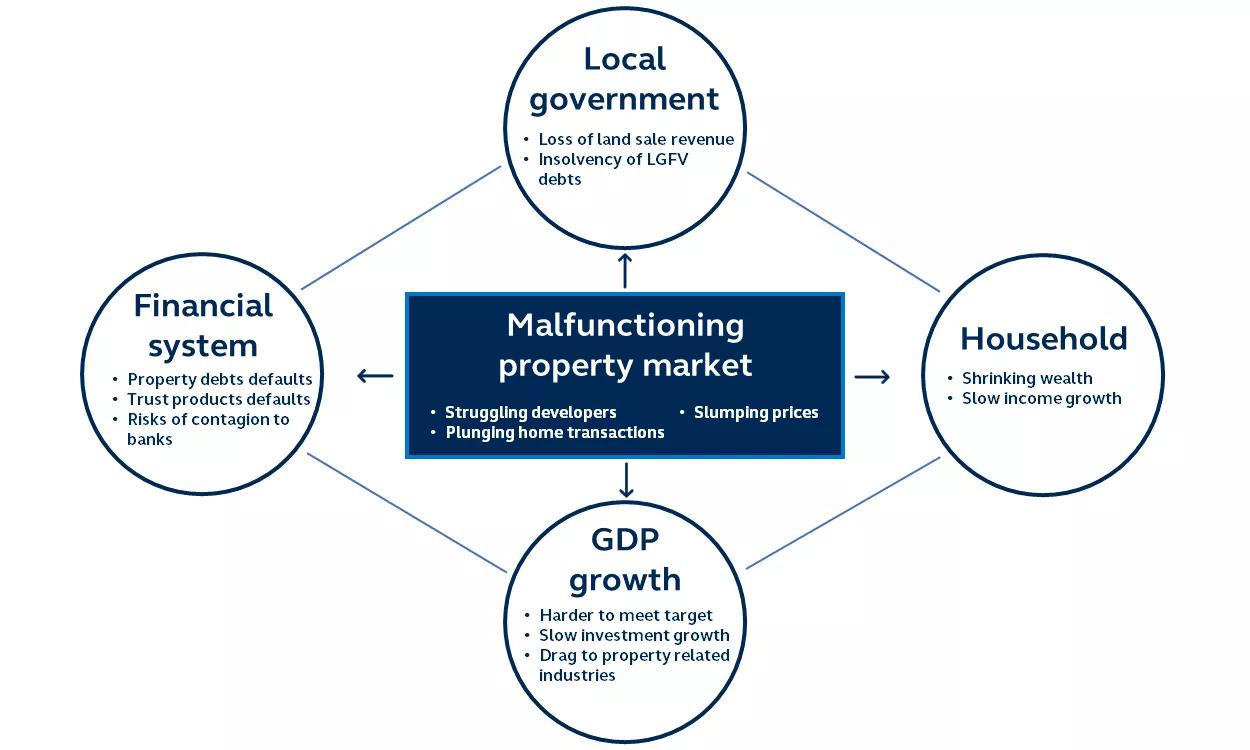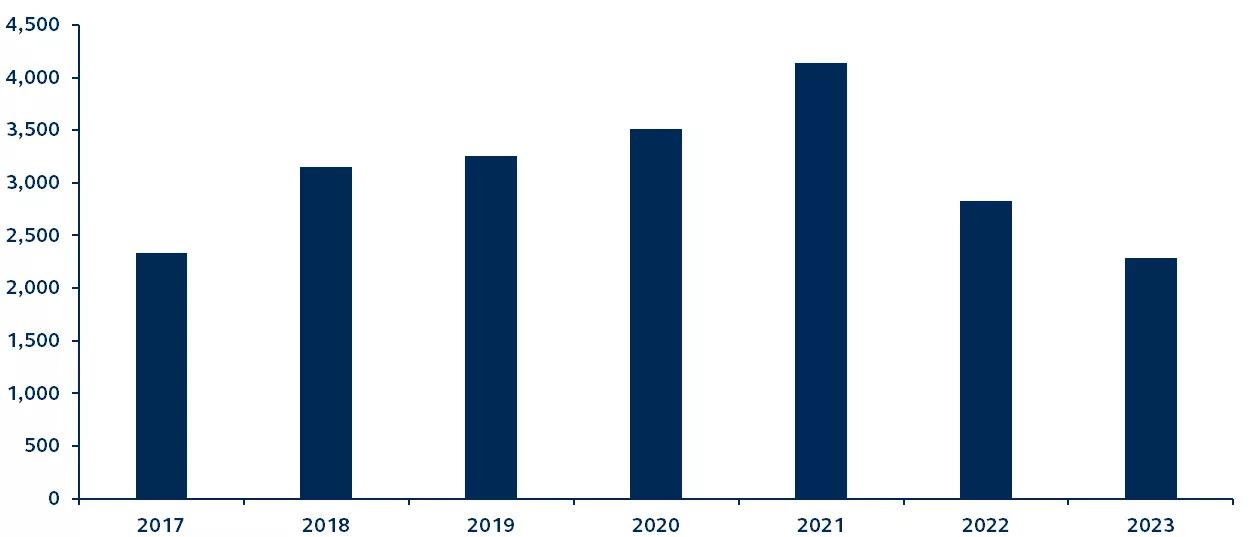
China’s economic performance has been extremely disappointing since the lifting of lockdowns late last year. After an initial surge in activity triggered enthusiastic debates of a “V” or “U” shaped recovery, economic momentum lost steam as confidence failed to recover, and youth employment stayed stubbornly high. Subsequently, economic data has repeatedly missed forecasts, the government’s 5% GDP growth target is now being met with skepticism, and fears of a deflation trap have engulfed investor sentiment. At the heart of China’s economic troubles lies the property sector, and until policymakers proactively and sufficiently target rejuvenating it, prospects for China likely remain dim.
Not just economic stress, but financial stress, too
Amid the weakening economic backdrop, signs of financial stress have also emerged. Concerns over local government funding vehicle (LGFV) debts arose in May as Guizhou, one of the poorest provinces in Southwest China, became the first province to face insolvency and pleaded for a central government bailout. In mid-August, Country Garden Group (China’s second-largest housing developer and previously its largest) missed bond payments, raising fears that property bond defaults may not just be limited to low-quality issuers. Also that month, Zhongrong Trust (a major trust company) defaulted on its payments to three companies that invested in its product, prompting questions about linkages between trust financing, the property sector and contagion risks. The health of China’s financial sector is back in investors’ focus, drawing comparisons to the U.S. regional bank crisis from earlier this year.
Property sits at the heart of the problem
While diverse, much of the financial stress and deepening economic weakness can be traced back to the malfunctioning property sector. In 2020-2021, a debt-fueled property bubble prompted policymakers to curb home purchases and property developer financing. Two years later, these policies have overcorrected, resulting in plunging home sales, falling property prices, unfinished buildings, and struggling developers. The problem has become so severe that it risks dragging the whole economy into a prolonged and damaging downturn.

There are four channels through which property impacts the overall economic and financial health of China:
GDP Growth: The property and construction sector together represented 13% of China GDP in 2022. When combined with related sectors such as cement, steel, and furniture, this percentage increases to between 20%-30%. The sizeable exposure to the overall property market implies that the government’s 5% GDP target will be hard to meet if the property sector doesn’t stop bleeding.
Households: The property sector has an outsized wealth effect compared to other investments in China. According to a 2019 People’s Bank of China (PBOC) survey, property accounts for 59.1% of Chinese household wealth, starkly contrasting to the United States’s 28.6%. Shrinking wealth, given the struggling property sector, is deterring consumers’ willingness to spend.
Local government: Land sales are traditionally an important revenue source for local government, accounting for about one-third of their revenue. Already wounded by COVID lockdowns, falling land sales are decimating local government’s budgets, fueling fears about LGFV debt, with some analysts describing LGFVs as the “black holes” of China’s financial system.
Financial system: Some trust products provide shadow bank financing to developers that, if a development project becomes distressed and default risks increase, potentially creates a dangerous loop between property and the banking sector.1 While the trust industry accounts for only a small part of China’s financial system, further strains in this space would certainly serve to dampen market sentiment at a time when investors are already nervous.
Failure of policymakers to stem the property market slump risks an escalating crisis of poorer households, indebted local governments, and weaker economic growth, threatening a vicious cycle of economic deterioration and asset price meltdown.
China land sales revenue through July of each year
Cumulative, $billions RMB

Source: Ministry of Finance of the People's Republic of China. Data as of July 31, 2023.
Policymaker actions
In fairness, policymakers have not completely ignored these downside risks. Yet stimulus measures have inadequately addressed the weakness in demand. During the first half of 2023, policymakers focused on completing unfinished buildings and gradually reducing restrictions on developer financing. However, restrictive mortgage policies and curbs on house purchases were mainly kept intact in Tier 1 and Tier 2 cities, nullifying the effects of the PBOC’s mini-steps of rate cuts—the 5-year loan prime rate (the key rate for mortgages) has only been cut 45 basis points, in total, over the past two years.2
More recently, there have been hints of a more proactive approach to the property sector’s woes. In the July politburo meeting, the well-known government slogan “houses are for living in, not for speculation,” was dropped, and policymakers noted the “changing dynamics of demand and supply in the property sector,” raising hopes that demand-stirring policies are on the way. However, policy follow-through has so far been gradual as China’s government is still wary of overstimulating. Encouragingly, since late August, policy easing has gathered some momentum with the relaxation of mortgage restrictions in Tier 1 cities, but more is likely needed to drive a sustained recovery.
Investment implications
Prudent policymaking is essential in an economy like China, which has a tendency toward excessive leverage. Nevertheless, there is a limited amount of time to act before the property sector’s struggles pull down the whole economy, and the longer the delay, the more drastic policy action it will require to counter the downward trend. The property sector's issues are among the factors impacting China's outlook and causing concern for global investors. Without adequate action from policymakers to address market weakness, investor enthusiasm for investment in China will likely be subdued. However, history has taught that China frequently makes policy adjustments during the bleakest times—an environment that can create investment opportunities for active investors.
1 Trust product is a wealth management product launched by trust companies which are often linked to shadow banking and attract high net worth investors through high potential returns.
2 Tier 1 cities are the four most economically developed cities (Beijing, Shanghai, Shenzhen, Guangzhou); and Tier 2 cities are moderately developed cities that are typically regional economic centers or provincial capitals.
For Public Distribution in the U.S. For Institutional, Professional, Qualified and/or Wholesale Investor Use Only in other Permitted Jurisdictions as defined by local laws and regulations.
Risk considerations
Investing involves risk, including possible loss of principal. Past performance is no guarantee of future results. Asset allocation and diversification do not ensure a profit or protect against a loss. International investing involves greater risks such as currency fluctuations, political/social instability, and differing accounting standards.
Important Information
This material covers general information only and does not take account of any investor’s investment objectives or financial situation and should not be construed as specific investment advice, a recommendation, or be relied on in any way as a guarantee, promise, forecast or prediction of future events regarding an investment or the markets in general. The opinions and predictions expressed are subject to change without prior notice. The information presented has been derived from sources believed to be accurate; however, we do not independently verify or guarantee its accuracy or validity. Any reference to a specific investment or security does not constitute a recommendation to buy, sell, or hold such investment or security, nor an indication that the investment manager or its affiliates has recommended a specific security for any client account. Subject to any contrary provisions of applicable law, the investment manager and its affiliates, and their officers, directors, employees, agents, disclaim any express or implied warranty of reliability or accuracy and any responsibility arising in any way (including by reason of negligence) for errors or omissions in the information or data provided.
This material may contain ‘forward-looking’ information that is not purely historical in nature and may include, among other things, projections and forecasts. There is no guarantee that any forecasts made will come to pass. Reliance upon information in this material is at the sole discretion of the reader.
This material is not intended for distribution to or use by any person or entity in any jurisdiction or country where such distribution or use would be contrary to local law or regulation.
This document is intended for use in:
- The United States by Principal Global Investors, LLC, which is regulated by the U.S. Securities and Exchange Commission.
- Europe by Principal Global Investors (Ireland) Limited, 70 Sir John Rogerson’s Quay, Dublin 2, D02 R296, Ireland. Principal Global Investors (Ireland) Limited is regulated by the Central Bank of Ireland. Clients that do not directly contract with Principal Global Investors (Europe) Limited ("PGIE") or Principal Global Investors (Ireland) Limited (“PGII”) will not benefit from the protections offered by the rules and regulations of the Financial Conduct Authority or the Central Bank of Ireland, including those enacted under MiFID II. Further, where clients do contract with PGIE or PGII, PGIE or PGII may delegate management authority to affiliates that are not authorised and regulated within Europe and in any such case, the client may not benefit from all protections offered by the rules and regulations of the Financial Conduct Authority, or the Central Bank of Ireland. In Europe, this document is directed exclusively at Professional Clients and Eligible Counterparties and should not be relied upon by Retail Clients (all as defined by the MiFID).
- United Kingdom by Principal Global Investors (Europe) Limited, Level 1, 1 Wood Street, London, EC2V 7 JB, registered in England, No. 03819986, which is authorized and regulated by the Financial Conduct Authority ("FCA").
- United Arab Emirates by Principal Global Investors LLC, a branch registered in the Dubai International Financial Centre and authorized by the Dubai Financial Services Authority as a representative office and is delivered on an individual basis to the recipient and should not be passed on or otherwise distributed by the recipient to any other person or organization.
- Singapore by Principal Global Investors (Singapore)Limited (ACRA Reg. No. 199603735H), which is regulated by the Monetary Authority of Singapore and is directed exclusively at institutional investors as defined by the Securities and Futures Act 2001. This advertisement or publication has not been reviewed by the Monetary Authority of Singapore.
- Australia by Principal Global Investors (Australia) Limited (ABN 45 102 488 068, AFS Licence No. 225385), which is regulated by the Australian Securities and Investments Commission and is only directed at wholesale clients as defined under Corporations Act 2001.
- This document is marketing material and is issued in Switzerland by Principal Global Investors (Switzerland) GmbH.
- Hong Kong SAR (China) by Principal Asset Management Company (Asia) Limited, which is regulated by the Securities and Futures Commission. This document has not been reviewed by the Securities and Futures Commission.
- Other APAC Countries/Jurisdictions, this material is issued for institutional investors only (or professional/sophisticated/qualified investors, as such term may apply in local jurisdictions) and is delivered on an individual basis to the recipient and should not be passed on, used by any person or entity in any jurisdiction or country where such distribution or use would be contrary to local law or regulation.
- Nothing in this document is, and shall not be considered as, an offer of financial products or services in Brazil. This presentation has been prepared for informational purposes only and is intended only for the designated recipients hereof. Principal Global Investors is not a Brazilian financial institution and is not licensed to and does not operate as a financial institution in Brazil.
Insurance products and plan administrative services provided through Principal Life Insurance Co. Principal Funds, Inc. is distributed by Principal Funds Distributor, Inc. Securities are offered through Principal Securities, Inc., 800 547-7754, Member SIPC and/or independent broker/dealers. Principal Life, Principal Funds Distributor, Inc., and Principal Securities are members of the Principal Financial Group®, Des Moines, IA 50392.
© 2023, Principal Financial Services, Inc. Principal Asset ManagementSM is a trade name of Principal Global Investors, LLC. Principal®, Principal Financial Group®, Principal Asset Management, and Principal and the logomark design are registered trademarks and service marks of Principal Financial Services, Inc., a Principal Financial Group company, in various countries around the world and may be used only with the permission of Principal Financial Services, Inc.
3104551


